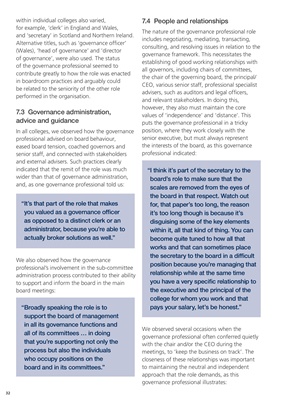
32
within individual colleges also varied,
for example, 'clerk' in England and Wales,
and 'secretary' in Scotland and Northern Ireland.
Alternative titles, such as 'governance officer'
(Wales), 'head of governance' and 'director
of governance', were also used. The status
of the governance professional seemed to
contribute greatly to how the role was enacted
in boardroom practices and arguably could
be related to the seniority of the other role
performed in the organisation.
7.3��Governance�administration,�
advice and guidance
In all colleges, we observed how the governance
professional advised on board behaviour,
eased board tension, coached governors and
senior staff, and connected with stakeholders
and external advisers. Such practices clearly
indicated that the remit of the role was much
wider than that of governance administration,
and, as one governance professional told us:
We also observed how the governance
professional's involvement in the sub-committee
administration process contributed to their ability
to support and inform the board in the main
board meetings:
7.4��People�and�relationships
The nature of the governance professional role
includes negotiating, mediating, transacting,
consulting, and resolving issues in relation to the
governance framework. This necessitates the
establishing of good working relationships with
all governors, including chairs of committees,
the chair of the governing board, the principal/
CEO, various senior staff, professional specialist
advisers, such as auditors and legal officers,
and relevant stakeholders. In doing this,
however, they also must maintain the core
values of 'independence' and 'distance'. This
puts the governance professional in a tricky
position, where they work closely with the
senior executive, but must always represent
the interests of the board, as this governance
professional indicated:
We observed several occasions when the
governance professional often conferred quietly
with the chair and/or the CEO during the
meetings, to 'keep the business on track'. The
closeness of these relationships was important
to maintaining the neutral and independent
approach that the role demands, as this
governance professional illustrates:
"�It's�that�part�of�the�role�that�makes�
you�valued�as�a�governance�officer�
as opposed to a distinct clerk or an
administrator,�because�you're�able�to�
actually�broker�solutions�as�well."
"�Broadly�speaking�the�role�is�to�
support the board of management
in all its governance functions and
all of its committees … in doing
that�you're�supporting�not�only�the�
process but also the individuals
who�occupy�positions�on�the�
board and in its committees."
"�I�think�it's�part�of�the�secretary�to�the�
board's�role�to�make�sure�that�the�
scales�are�removed�from�the�eyes�of�
the board in that respect. Watch out
for,�that�paper's�too�long,�the�reason�
it's�too�long�though�is�because�it's�
disguising�some�of�the�key�elements�
within it, all that kind of thing. You can
become quite tuned to how all that
works and that can sometimes place
the�secretary�to�the�board�in�a�difficult�
position�because�you're�managing�that�
relationship while at the same time
you�have�a�very�specific�relationship�to�
the executive and the principal of the
college�for�whom�you�work�and�that�
pays�your�salary,�let's�be�honest."